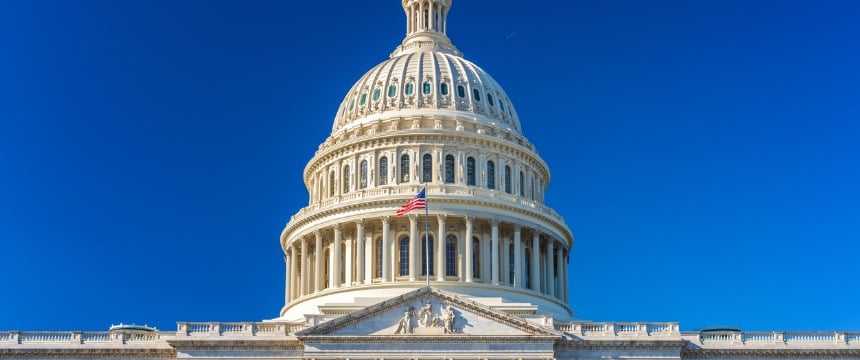
Tuesday night, President Joe Biden spoke to Congress in his first State of the Union address. In an hour long speech, President Biden covered a variety of topics and urged Congress to pass numerous pieces of legislation. Biden’s agenda looked significantly different from his address to Congress in April 2021. Urging bipartisanship, Biden pushed an agenda that appealed to Democrats and Republicans. A multitude of topics received bipartisan applause including support for Ukraine, the implementation of the Infrastructure Investment and Jobs Act, and various healthcare and business proposals.
Conflict in Ukraine
To begin the speech, Biden covered the current conflict in Ukraine. To back up his support for the Ukrainian regime, Biden highlighted the economic sanctions that the U.S. and its Allies have enacted towards Russian banks and Oligarchs. Biden announced that the U.S. would join the European Union (EU) in closing off American air space to all Russian flights. Biden stated that he would work to ease the potential ramifications that economic sanctions can have on the American people, noting that the U.S. and its Allies have worked to release 60 million barrels of oil around the world and 30 million barrels from the U.S. Strategic Petroleum Reserve.
COVID-19 Recovery
Biden then transitioned to COVID-19 recovery and his domestic agenda. Biden highlighted the key aspects of the American Rescue Plan and pushed back against the 2017 Tax Cuts and Jobs Act from the Trump Administration. Biden touted the growth of the economy and low unemployment, while also stating that COVID-19 no longer needs to control the lives of Americans. Later on in the speech, Biden rolled out a new program, the “test to treat initiative”, stating that those that test positive for COVID at a pharmacy, can begin to receive anti-viral pills immediately.
Domestic Manufacturing
Biden highlighted the enactment of the bipartisan Infrastructure Investment and Jobs Act, noting various goals that his Administration has outlined. Specifically, Biden spoke about installing 500,000 electric vehicle (EV) charging stations across the country, replacing lead pipes, and increasing broadband access. While speaking of infrastructure projects, Biden stated that he would remain steadfast towards making products in America.
Biden then moved on to competition legislation. Congress has passed the COMPETES Act and the U.S. Innovation and Competition Act, however neither have been sent to the President’s desk. Biden rebranded the competition legislation as the “Bipartisan Innovation Act”. Pushing for increased domestic manufacturing, Biden highlighted Intel’s new investment into a $20 billion semiconductor “mega site” in Columbus, Ohio. Biden stated that the site would include up to eight manufacturing factories and 10,000 new jobs. Intel’s CEO, Pat Gelsinger, was in attendance.
Continuing on increasing domestic manufacturing, Biden highlighted projects by Ford to invest $11 billion to build EVs and GM to invest $7 billion into building EVs. Both projects are projected to create 15,000 new jobs across the country. Quoting Ohio Senator Sherrod Brown (D), Biden said that “it’s time to bury the label ‘Rust Belt’”.
Biden utilized the competition legislation as a means to fight inflation on the domestic front. Stating that the pandemic caused adverse conditions that depressed manufacturing. Biden invoked increasing prices for automobiles as an example of why there is a need for competition legislation. Biden implored American businesses to “lower your costs, not wages” and to “make more cars and semiconductors in America”.
Healthcare, Energy, and Taxes
Biden then pivoted to his healthcare agenda. A key aspect of the Build Back Better Act, he called to have Medicare negotiate lower prices for prescription drugs. Biden also called on capping the cost of insulin at $35 a month. Biden touted his successes from the American Rescue Plan, stating that it allows families on Affordable Care Act plans to save $2,400 a year on health care premiums. Speaking on elderly care, Biden stated that more “Wall Street firms” are engaged with nursing homes. Biden stated that this would “end on [his] watch” and that Medicare would set the standards for nursing homes.
Biden didn’t cover his energy agenda extensively, however he highlighted a few key aspects of the Build Back Better Act. He called on Congress to pass investment tax credits to weatherize homes and businesses, and to increase solar and wind investment to transition the U.S. towards more clean energy.
On tax policy, Biden reiterated his campaign promises of increasing taxes on wealthy individuals and corporations. He proposed a 15% minimum tax rate on corporations and stated that he would not increase taxes on individuals making less than $400,000 annually. Biden called on lowering the national deficit and stated that the Department of Justice would install a Chief Prosecutor to investigate pandemic relief fraud.
Unity Agenda
Following a discussion on his crime agenda, the nomination of Judge Ketanji Brown Jackson to the Supreme Court, and voting rights legislation, Biden finished his speech on a bipartisan note. Proposing a “Unity Agenda”, Biden called on Congress to ramp up the fight against the opioid epidemic, for Congress to pass a mental health package, for more support for Veterans returning from Iraq and Afghanistan, and rolled out the Cancer Moonshot program. When calling for increased funding towards the Cancer Moonshot program, Biden called on Congress to fund ARPA-H, the Advanced Research Projects Agency for Health. Biden finished his speech reporting that the state of the union was strong and called on Congress to pass his agenda. A complete transcript of the speech is available here.
Now that Congress has its marching orders, March is shaping up to be a busy month in Washington. To stay up to date with what’s happening next, you can view the Foley monthly newsletter here.
As the Russia-Ukraine war continues, so too do new business and legal implications for companies around the world. For more information on how to mitigate risk and protect your business, contact a Foley lawyer today.
